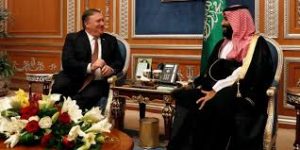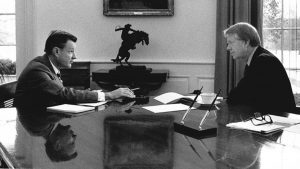Merriam-Webster defines realpolitik as “politics based on practical and material factors rather than on theoretical or ethical objectives” and the Trump administration has taken the idea to a new low in American foreign policy.

In an opinion piece published last Tuesday in the Wall Street Journal, Mike Pompeo, the American Secretary of State, lashed out at the criticism of the administration’s policy concerning Saudi Arabia after the brutal murder of Jamal Kashoggi.
Pompeo linked condemnation for the murder with support of the Joint Plan of Action as the agreement with Iran concerning its nuclear program was called. He appears to be saying that sure we do business with murderous Saudis but the Iranians are worse.
What Mr. Pompeo seems to miss is a history of United States foreign policy that goes back to President Woodrow Wilson and even before. Some call this idea american exceptionalism and I understand it to mean the United States sees itself as a positive force in the world and will subordinate its national interest to a higher ideal of bringing peace and democracy to the world.
Mr. Pompeo says that the Saudi Kingdom is a “powerful force for stability in the Middle East” and places the blame for the war in Yemen on Iran rather than the Kingdom which, as far as I can tell, started it. He seems to be unaware of the insidious role that Saudi financed Wahhabi fundamentalism has had on islamic politics around the world and the danger it represents.
In his apparently simplistic understanding of the Middle East, the Saudi’s wear the white hats and Iran the black hats. In this he is blindly following the directions of his boss, Donald Trump, who signaled his full support for Saudi Arabia by making it the first country he visited as U.S. President.

Mr. Pompeo defends his point of view by claiming to be in sync with Jeane Kirkpatrick, who published a well known essay in 1979 titled Dictatorships and Double standards.
Pompeo, in my view, either misunderstood Ambassador Kirlpatrick’s essay or perhaps he did not bother to read it. Ambassador Kirkpatric wrote the article in 1979, as a harsh criticism of the Carter Administration’s policies in Iran and Nicaragua. In her view Carter and his foreign policy team were well intentioned but working under a wrong assumptions about the historical direction of the world.
Specifically, Ambassador Kirkpatric believed that it would take decades or centuries for the world’s autocracies to evolve into democracies and that communist countries not only had never done so, but never will.
Her lens was soviet expansionism and she fundamentally rejected what Zbigniew Brzezinski called rational humanism or the idea that the world would eventually and irrevocably evolve into a peaceful world of global politics and interdependence.
It is in this context that she felt strongly that the United States should engage with its allies even if they are autocratic and gently encourage them towards more pluralism and gradual reforms. Her strongest criticism of President Carter, is that he insisted on democratic reforms in authoritarian regimes exactly when they were being attacked by enemies she considered to be in league with the Russian enemy. Her view is that the U.S. should support its friends against this threat in difficult times even if they are imperfect.
For Pompeo and Trump the enemy is not the former Soviet Union but Iran. He appears to buy Muhammed Bin Salman’s modernization story but at the same time ignores the real transformation underway in Iranian society with a double standard that is much like what Ambassador Kirkpatric was complaining about in the Carter Administration. She thought they only saw problems with right wing dictators rather than their left wing counterparts.

What he completely misses is that at the heart of her argument, Ambassador Kirkpatric was wrong and Mr. Brezinski and the Carter team were right. Only 40 years later the vast majority of the world’s governments are, in fact, democratic, and we live in a globalized world which is wealthier beyond anyone’s imagination and completely interdependent.
At a certain point in time the Carter administration decided that Anastasio Samoza and the Shah of Iran could not be saved. The question was how could the United States use its influence to help those countries chart a peaceful and steady path to a better future.
What Ambassador Kirkpatric was right about was that the policy failed. What we will never know is that if using American blood and treasure would have saved those regimes and brought the people of those countries a better life.
The Saudi Crown Prince believes that he can order the murder of an American resident and get away with it because of the size of his country’s weapons purchases and his country’s control of global oil prices. President Trump and his Secretary of State believe that American prestige and the fifth fleet, stationed in Bahrain, should be used to help the House of Saud defend themselves against Iranian aggression.
The only problem with the narrative it is based on an incorrect understanding of the causes and realities of the war in Yemen and an assumption that the House of Said has any chance of withstanding the storm that it will face. In my view the challenge will not come from Iran but from the people of Saudi Arabia who may tire of the Kings and Princes who keep so much of the national wealth for themselves and their family.

